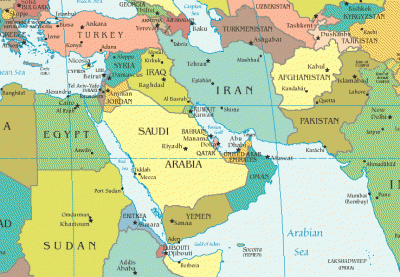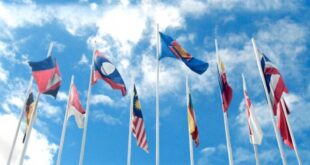It may be pure coincidence that the recapture of Mosul by Iraqi forces was accomplished on the anniversary of the defeat of Israel’s July 2006 assault on Lebanon. But there is a clear link between these two achievements: they underline the regional ascendancy of Iran and its allies, who have been securing one gain after another on a variety of fronts.
In his speech marking the Lebanese resistance’s victory, Hezbollah leader Hassan Nasrallah made sure to salute the Iraqi forces’ triumph against Islamic State (IS)/Daesh in Mosul, which de described as a ‘great and very significant victory, even if some have tried to belittle it.’ In an important gesture, he also made a point of praising Iraqi Sunni political and religious leaders, saying their ‘exceptional’ and ‘courageous’ attitude toward the war on IS had foiled attempts to sow sectarian strife in the country.
While members of the Iranian-led alliance have been celebrating success in Iraq, Syria and Lebanon, the rival Saudi-led axis and its project are on the retreat, in large part becasue its members are beset by domestic crises and internecine tensions, especially over the issues of Qatar and Yemen. As the so-called Iranian ‘belt’ stretching from Mazar-i-Sharif in Afghanistan to Beirut’s southern suburbs on the Mediterranean coast, and including Iraq and Syria, expands and strengthens, the opposing axis’ lack of cohesion has resulted in setbacks in Syria, Iraq, and Yemen.
One the secret of the former’s success is that it invokes the ‘legitimacy’ of resistance against Israeli occupation, while the Saudi axis seeks to ‘legitimize’ normalization with Israel. That is where the two camps differ and diverge.
Nasrallah was right to praise the stance taken by Iraqi Sunni leaders and their role in averting strife. His remarks reflect deep and well-founded fears that regional and international players will step up efforts to trigger a Sunni-Shiite sectarian crisis in Iraq. This could take the form of sponsoring the emergence of new Sunni armed factions to fill the vacuum caused by the disappearance of IS and its ‘caliphate’, while avoiding repeating some of the group’s mistakes and excesses.
Iran’s own policy of setting up allied volunteer paramilitary forces modelled on its Revolutionary Guards (IRGC) has proven to bear fruit. After the success of the Hezbollah experiment in Lebanon, we now have a parallel force in Iraq, the Popular Mobilization Units (PMU) that played a major role in defeating IS in Mosul. While the two groups have features in common, the differences between them cannot be ignored: most notably, Hezbollah is less sectarian, more tolerant, and more disciplined than the PMU, even though the latter includes Iraqi Sunni commanders and fighters in its ranks.
The US boasted when it invaded and occupied that it had established a ‘New Iraq’ on the ruins of the nationalist and cross-sectarian Baath Party’s rule. Today, after the recapture of Mosul, we could be witnessing the emergence of a ‘Newer Iraq’ which regains its role as a major regional power under the umbrella of the Iranian-Syrian axis.
Nasrallah referred obliquely to forces that were trying to denigrate the importance of the victory achieved by liberating Mosul. He could have been more forthright in addressing the fears felt by many Iraqis and Arabs that the ‘Newer Iraq’ may drift towards sectarianism and vindictiveness. Such inclinations exist and have been manifest in more than one incident, even if some may dismiss them as individual and isolated.
The political geography of the Arab world is on the verge of a new transformation due to the fast-moving developments in Syria, Russia’s growing role, and the unravelling of most of the plans which for the past six years have banked on bringing about regime-change in Damascus.
The golden age during which Gulf money controlled the region for two decades is rapidly drawing to a close. This is not only due to declining oil revenues and the depletion of the Gulf’s financial reserves, but also because the turmoil and instability inflicted on the wider region increasingly threaten to spread to the Gulf itself. The US is complicit in this, with three Gulf states – Saudi Arabia, Qatar, and the UAE – facing the prospect of American lawsuits on charges of sponsoring terrorism. There are already 15 cases before the US courts against them alleging complicity in the 9/11 attacks, with compensation claims that could reach trillions of dollars.
Israel has been the main beneficiary so far of the wars and fragmentation schemes ravaging the region. But this is only for the short-term. The changes that are taking place and the new balances of power that will result will eventually pose it an existential threat. What Israel now fears most is the presence of Iran’s paramilitary extensions on its borders in southern Syria, be they Hezbollah, the IRGC or the PMU. Iran’s dissatisfaction with the US-Russian understandings on a ceasefire in southern Syria is telling in this regard – and suggests the success and sustainability of these understandings must be open to doubt.
Egypt, meanwhile, has maintained its relations with Syria, its foreign minister formally congratulated Baghdad on the Mosul victory, and its media have toned down criticism of Iran. This despite Egypt’s membership of the four-way alliance with Saudi Arabia, the UAE and Bahrain against Qatar. The impression conveyed is that Cairo is wary of placing all its eggs in the much-punctured Saudi basket.
The Middle East is on the threshold of changes that could weaken the hegemony of the US if not end it entirely, and tip the balance in favour of the winning axis. Time alone will tell.
Abdel Bari Atwan – London
 Geostrategic Media Political Commentary, Analysis, Security, Defense
Geostrategic Media Political Commentary, Analysis, Security, Defense





